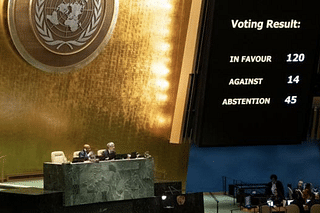November 1, 2023
India’s Abstention in UNGA Vote on Israel-Hamas Conflict Resolution

Introduction:
- The recent United Nations General Assembly (UNGA) vote on a resolution concerning the Israel-Hamas conflict saw India abstaining from the vote. This article delves into the nature of UNGA resolutions, the specifics of the resolution in question, and the rationale behind India’s abstention.
UNGA Resolutions and Voting
What are UNGA Resolutions?
- UNGA resolutions cover a wide array of global issues, including disarmament, climate change, and humanitarian aid. They can be of different types, including regular, consensus (adopted without a vote), and procedural resolutions.
UNGA Resolutions and Voting
- Initiation: UNGA resolutions originate from member states, UN committees, or regional groups after thorough negotiations and debates.
- Enforcement: While non-binding, they hold significant moral and political influence on member states and UN bodies, shaping international norms and state behavior.
- Features: These resolutions are discussed and adopted during annual sessions, with the possibility of special sessions when required. Each member state has an equal vote, ensuring equality regardless of size or influence.
Resolution over Israel-Hamas War
The Resolution’s Scope
- The resolution, titled “Protection of civilians and upholding legal and humanitarian obligations,” was proposed by Jordan on behalf of the Arab League and co-sponsored by approximately 40 countries. It called for an immediate humanitarian truce, cessation of hostilities, and unhindered humanitarian access to Gaza. However, it did not specifically refer to the terror attacks by Hamas.
Voting Outcome
- Ultimately, the resolution passed with 120 votes in favor, 14 against (including the US and UK), and 45 abstentions, with India among the abstaining nations.
India’s Abstention
Rationale
- India defended its abstention by highlighting the absence of “explicit condemnation” of the October 7 terror attacks in Israel in the resolution. Since India’s concerns were not addressed in the final text, abstaining was the chosen course of action.
Key Elements of India’s Statement
- Condemnation of violence, including the October 7 attacks by Hamas.
- Acknowledgment of the humanitarian crisis in Gaza and support for international de-escalation efforts.
- Concern about the security situation and a call for all parties to exercise restraint.
- Reiteration of India’s support for a negotiated two-state solution in the Israel-Palestine issue.
- Encouragement for diplomacy and dialogue to create conditions for peace negotiations.
Why the Furore Over India’s Action?
Divergence from Past Votes
- India’s abstention marked a departure from its previous vote in favor of a UNGA resolution calling for a ceasefire in Gaza in 2018 and other similar votes in the past.
Criticism and Significance
- Opposition parties in India criticized the government for not taking a stronger stand on the humanitarian issue. India’s abstention stood alone among countries in the Global South, South Asia, and BRICS, all of which had voted in favor of the resolution.
Significance of India’s Action
Balanced Approach
- India’s abstention mirrors its approach to other global conflicts, seeking to maintain a diplomatic balance between opposing sides.
Not Legally Binding
- Unlike UN Security Council resolutions, UNGA resolutions are not legally binding, meaning that Israel and the US are not obligated to act on it.
Moral Authority
- Despite its non-binding nature, the resolution carries significant moral weight, with 120 votes in favor signifying support for international law and proportionate use of force.
Principled Stand
- India reiterated its support for a negotiated two-state solution to the Israel-Palestine issue and called for diplomacy and dialogue to resolve the conflict.
Conclusion
- India’s abstention in the recent UN General Assembly vote reflects its balanced and nuanced approach to international conflicts. While drawing criticism from some quarters, it underscores India’s commitment to principles of diplomacy and its focus on a negotiated resolution to complex global issues.
National Commission for Scheduled Tribes (NCST)
November 5, 2024
Dutch gravity canal system
November 5, 2024
हॉटस्पॉट तकनीक:HotSpot Technology
November 5, 2024
